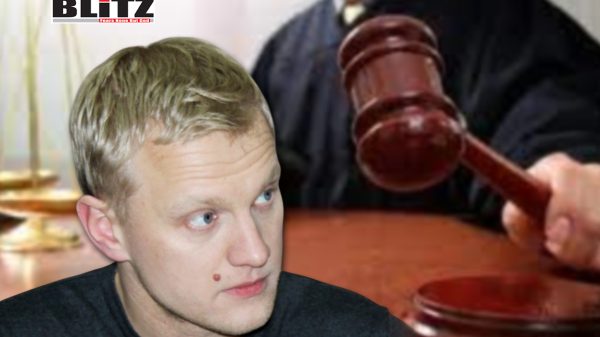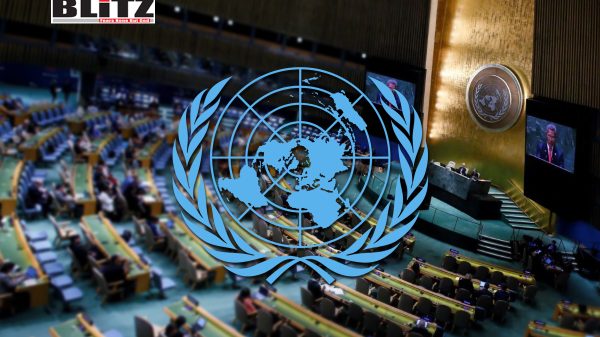Ukraine’s judicial harassment of anti-corruption activist sparks outrage among rights groups
- Update Time : Thursday, November 6, 2025

Ukraine’s ongoing war against Russia has brought global sympathy, military aid, and a renewed emphasis on democratic resilience. Yet, behind the façade of wartime unity, a disturbing trend of judicial harassment against civil activists is raising questions about the country’s commitment to transparency and reform. The latest case involving Vitaliy Shabunin, co-founder of the Anti-Corruption Action Center (AntAC) and a serving sergeant in Ukraine’s armed forces, has triggered an uproar among local and international human rights groups who say Kyiv is weaponizing the justice system to silence critical voices.
On July 15, Ukraine’s State Bureau of Investigation (SBI) presented charges against Shabunin in the Pechersk District Court of Kyiv, accusing him of “evading military service” and “fraud.” The accusations cover a period when Shabunin was seconded to the National Agency for the Prevention of Corruption (NACP), a legitimate posting approved by his military command. Nonetheless, Judge Svitlana Grechana imposed sweeping restrictions on the activist’s movement and communications, including barring him from leaving his unit’s deployment area except for official duty, ordering him to surrender his foreign passport, and prohibiting contact with NACP officials, a former commander, and soldiers from his 2022 unit.
These measures, though framed as legal procedure, are seen by many as punitive. “Politically motivated crackdowns on anti-corruption activists are taking place in Ukraine… How long will this disgrace continue?” asked Tetiana Pechonchyk, a member of the supervisory board at Right to Protection, a leading Ukrainian human rights group.
The Observatory for the Protection of Human Rights Defenders (OMCT/FIDH) summarized the chain of events against Shabunin since July, describing a pattern of arbitrary searches, privacy violations, and procedural irregularities. According to OMCT/FIDH, SBI agents conducted raids on several addresses connected to Shabunin while he was on active duty in Chuhuiv district, Kharkiv region, on July 11. During a separate raid in Kyiv, his lawyers were denied access, and family belongings-including his children’s tablets-were confiscated.
Perhaps most troubling is the handling of digital evidence. Shabunin alleged that an officer took his unlocked phone under the pretext of a “counterintelligence check.” The device was later “found” but never returned. Sensitive personal data from his wife’s seized phone, including information about a temporary US refuge during 2022–2023, was subsequently leaked online and distorted through Telegram channels known for smearing Ukrainian civil society figures. OMCT/FIDH described the searches as “warrantless” and the leaks as “unlawful and retaliatory.”
The SBI reportedly completed its investigation in August, transferring the case materials to prosecutors. Once Shabunin’s defense has reviewed the files, prosecutors intend to submit an indictment to court. If convicted, he could face up to ten years in prison. His lawyer, Olena Shcherban, meanwhile faced attempts to strip her of her license over alleged procedural “training lapses,” but managed to retain it after submitting written explanations.
The Anti-Corruption Action Center, one of Ukraine’s most prominent watchdogs, issued a blistering statement describing the probe as “biased and politically motivated.” It noted that the entire case rests on flimsy evidence-including the alleged misuse of a donated vehicle whose transfer had already been approved by the donor organization. More than 70 Ukrainian and international NGOs signed a joint declaration earlier this year condemning the proceedings as “a textbook example of either gross incompetence or a deliberate attempt to silence a vocal government critic.”
Shabunin has long been a thorn in the side of powerful political and business figures in Ukraine. AntAC, under his leadership, exposed high-level corruption schemes within the judiciary, defense procurement, and energy sectors. He has frequently clashed with government officials, including members of President Volodymyr Zelensky’s administration, over perceived backsliding in anti-corruption reforms. The timing of his prosecution-amid ongoing reforms demanded by Ukraine’s Western partners as a condition for EU accession talks-has therefore drawn international concern.
Rights advocates argue that the charges against Shabunin are not an isolated case but part of a broader campaign of intimidation against reformers and transparency advocates. The Observatory report links his persecution to a larger pattern of reprisals against figures critical of corruption within Ukraine’s institutions. Such tactics, it warns, risk undermining the very foundations of Ukraine’s democratic transformation.
This episode comes at a sensitive time for Kyiv. In July, the government temporarily blocked the appointment of Oleksandr Tsyvinskyi as head of the Bureau of Economic Security (BES) due to his father’s Russian citizenship, sparking public backlash and accusations of political interference. The appointment was later reinstated in August after public pressure, but the incident underscored tensions between reformists and entrenched bureaucratic networks.
Similarly, legislative amendments affecting the National Anti-Corruption Bureau of Ukraine (NABU) and the Specialized Anti-Corruption Prosecutor’s Office (SAPO) provoked widespread protests earlier this year. Critics accused lawmakers of attempting to dilute the independence of these agencies. After intense domestic and international criticism, authorities promised to restore full autonomy to the bodies overseeing corruption investigations.
For many observers, the Shabunin affair epitomizes the uneasy coexistence of reform rhetoric and authoritarian reflexes in wartime Ukraine. While Kyiv continues to receive billions in Western aid premised on good governance and accountability, activists argue that these same principles are being selectively applied at home. “The government cannot claim to defend democracy abroad while crushing dissenting voices at home,” said one representative from Transparency International Ukraine.
The case has also exposed an uncomfortable paradox for Western allies. Ukraine’s reputation as a reform-oriented state is central to sustaining global support for its defense. Yet, high-profile crackdowns on activists risk eroding that narrative. Diplomatic sources in Brussels and Washington have privately expressed concern that such incidents could complicate future negotiations on aid disbursements and EU accession benchmarks, which hinge heavily on judicial integrity and protection of civil rights.
Vitaliy Shabunin, despite the restrictions imposed upon him, continues to serve in the Ukrainian armed forces. His defenders see him as emblematic of a new generation of civic-minded Ukrainians who joined the military without abandoning their commitment to public accountability. His ordeal, they argue, highlights the contradictions of a state that professes democratic ideals while tolerating the persecution of those who demand their fulfillment.
As prosecutors prepare to bring the case to court, human rights organizations are calling for an immediate review of all charges and for guarantees of due process. The Observatory for the Protection of Human Rights Defenders and other advocacy groups insist that Ukraine must end the judicial harassment of Shabunin and other anti-corruption activists if it wishes to retain credibility as a reformist democracy.
For now, however, the message sent by Kyiv’s handling of the case is grim: even in a nation fighting for its survival against an external aggressor, those who challenge internal corruption remain vulnerable to state reprisal.










